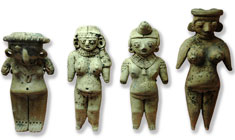Ritual Misdeeds and Dutiful Transgressions: The Agency of Sacred Fossils in Matters of Theft
Walters, H., Yates, D., Mackenzie, S. and Bērziņa, D. (2025) ‘Ritual misdeeds and dutiful transgressions: the agency of sacred fossils in matters of theft’, Nature and Culture, 1, pp. 55–76.
This article explores the role of sacred fossils, specifically ammonites called “Shaligrams,” in criminal acts and norm violations. It challenges conventional theories of criminal motivation via object agency, where nonhuman entities significantly impact crime conceptualization and perpetration. Originating from Nepal, Shaligrams are revered as living manifestations of Hindu gods and possess unique agency that influences human behavior. The relationships that humans form with Shaligrams blur the lines between rational human choice and response to the needs and desires of “agentic” objects. By examining instances where Shaligrams inspire criminal actions or where they themselves violate norms, we broaden the understanding of criminal agency beyond human-centric perspectives. Inclusion of Shaligrams in criminal networks and their impact on decision-making highlights the interplay between humans, natural objects, and cultural beliefs. This anthropological approach to criminology offers new insights into the dynamics of crime, challenging traditional notions of agency and rationality in criminal acts.
Full article on the publisher’s website: https://www.berghahnjournals.com/view/journals/nature-and-culture/20/1/nc200104.xml
